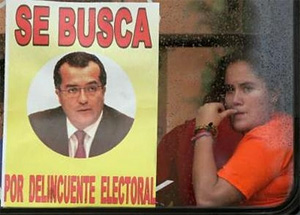 |
 |
 |
 Editorials | At Issue | July 2006 Editorials | At Issue | July 2006  
Mexico's Election: Lurching Toward Resolution
 Dolly Mascarenas - Time.com Dolly Mascarenas - Time.com


| | A supporter of Andres Manuel Lopez Obrador, presidential candidate of the Party of the Democratic Revolution (PRD), looks out the bus window next to a poster showing the Federal Electoral Institute (IFE) President Luis Carlos Ugalde after a protest demanding a vote recount in opposition to candidate Felipe Calderon in Mexico City July 24, 2006. The poster reads in Spanish 'Wanted, electoral delinquent'. (Reuters/Tomas Bravo) |
Mexico's next president will be chosen by the country's electoral tribunal, and he will carry the mandate not of the majority, but of the largest minority. Right now, the provisional result gives the job to Felipe Calderon of the ruling conservative National Action Party, by a margin 243,934 out of 70 million registered voters (0.58%). Calderon is doing his best to talk and act as a president-elect, but the alliance backing the center-left candidate Obrador claims its man won but the counting was crooked, and is demanding a ballot-by-ballot recount to prove their case. So, the outcome will be determined by how the electoral tribunal, known by its Spanish initials TEPJ, responds to the demand for a recount.

The TEPJ, which is empowered to make a binding decision on the outcome, and is required to do so by Sept. 6, agreed Thursday to hear proposals from each of the campaigns. Obrador's supporters have demanded a recount in the presence of magistrates, on camera, with representatives of all parties present — a process they estimate will take between 6 and 12 days. But the PAN insists that its man won fair and square, and flatly rejects a recount.

The standoff leaves three scenarios for resolving Mexico's political deadlock:

• The electoral tribunal could simply ratify the provisional results it released earlier, and name Calder??s winner. That would be legal, but might lack legitimacy in the eyes of much of the population, whose skepticism is fueled by a longstanding tradition of electoral fraud. Calderon could therefore take office under the shadow of suspicion, and might struggle to find the support necessary to govern effectively from a congress in which he lacks a majority. Also, Obrador's supporters have taken to the street in the hundreds of thousands, and appear in no mood to accept a defeat they insist was fraudulent.

• The TEPJ could accept Obrador's challenge to the process and order a recount. Obrador has said his alliance will accept any outcome as long as the process is transparent. But if the recount makes Obrador the winner, there is a danger that PAN would resort to "civil disobedience," as it has done in the past like closing federal highways or organizing sit-ins in public offices, and make it difficult for Obrador to govern. The center-left candidate won't find it any easier to win a congressional majority for his policies than would Calder.

• The tribunal could nullify the election, which would require Congress to appoint an interim president and schedules new elections within 18 months. That, too, would restrict governance, and simply usher in another long season of campaigning.

The lawyers of the main political parties are not the only voices seeking to sway the decision of the electoral tribunal. More than a half million people attended a rally staged in Mexico City by Obrador's supporters last Sunday, and another is planned for July 30. The campaign also plans a massive show of strength to coincide with the announcement of the results. Predictably, tension is rising on the streets between supporters of rival campaigns. Mexico's hot political summer may get even hotter before it cools down. | 
 | |
 |



